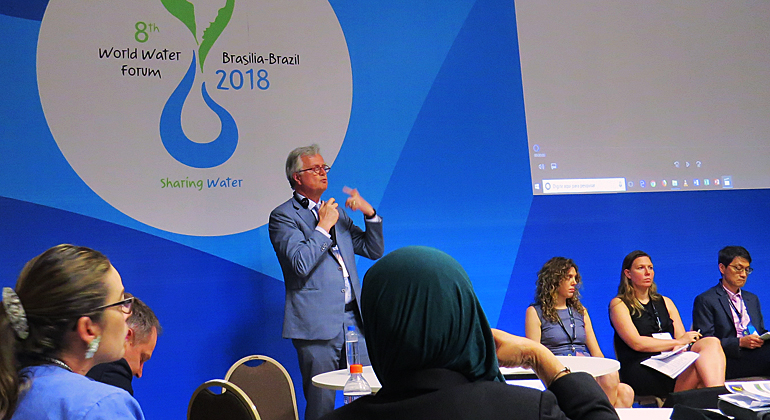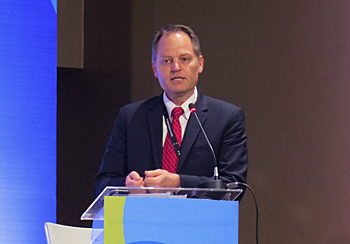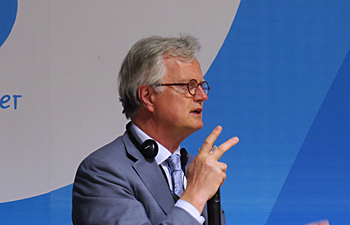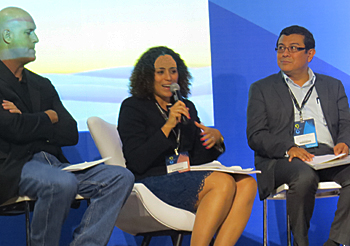World Water Forum 8: Revitalised IWRM-concept can boost action on SDG6 for water

‘Step out of your isolated ivory water tower and share your ideas on fresh water resources with farmers, communities, businesses and nature conservation groups. Define your goals for the sustainable use of water resources and discuss them with all stakeholders,’ advised Peter Glas at one of the many sessions of the 8th World Water Forum in Brasilia, Brasil.
Glas is chairman of the Dutch regional water authority De Dommel. At the Forum he was involved in sessions specially devoted to Integrated Water Resource Management (IWRM) and Sustainable Development Goal #6.5 that calls for implementation of IWRM at all levels by 2030 worldwide.
However, the current IWRM-concept is considered to be too top down, too technocratic and too idealised. At three sessions of the World Water Forum 8 the need to revitalise the concept was discussed.
 Mark Smith of IUCN suggested to connect the IWRM-concept to five mechanisms that can bring it into action.
Mark Smith of IUCN suggested to connect the IWRM-concept to five mechanisms that can bring it into action.
IWRM is a complex beast
Just prior the Forum a special working group of the World Water Council had released a paper on the issue of integrated water resource management and it’s crucial role in reaching all Sustainable Development Goals by 2030. Not only SDG#6 on water.
‘IWRM is a complex beast’, remarked director Mark Smith of the Global Water Programme at the International Union for Conservation of Nature (IUCN) and one of the authors of the document.
‘We need to change the current concept into a system that drives change’, he said. ‘The problem of water scarcity is still growing, so apparently the current IWRM is not delivering fast enough.’
Most countries in the world have introduced some kind of IWRM and over half of all countries have integrated water plans and policies in place.
Yet, it is predicted by the OECD that by 2050 some four billion people will live in water stressed areas. Here the water demand will exceed the sustainable supply and further deplete the fresh water resources, such as groundwater, rivers and lakes.
 Peter Glas of Dutch regional water authority De Dommel moderating one of the sessions on revitalisation of integrated water resource management.
Peter Glas of Dutch regional water authority De Dommel moderating one of the sessions on revitalisation of integrated water resource management.
System change on water management
Mark Smith stated that IWRM addresses the system of water management, so it has the potential to fundamentally change the way water resources are used.
‘That is the good news’, Smith said, ‘because we need solutions that work fast. There is little time left if we want to achieve the SDGs by 2030.’
The bad news according to Smith is that the current IWRM-concept is too slow. ‘It does not deliver the necessary change in water management fast enough to make water resources used sustainably’.
Umbrella with action pillars
Smith suggested to use the current four-pillared IWRM-concept as an overarching framework and add operating mechanisms. These mechanisms can be used to transform policies and principles into pragmatic action across all SDGs.
Smith mentioned five mechanisms to trigger a better management of water resource: foster the dialogue on the water-energy-food nexus, foster water stewardship in business, restore ecosystems, integrate flood management, and introduce source-to-sea management.
 Panellist Aziza Akhmouch of the OECD remarked that IWRM often ends in itself where it should be used as a mean to improve the water supplies.
Panellist Aziza Akhmouch of the OECD remarked that IWRM often ends in itself where it should be used as a mean to improve the water supplies.
Stick to goals
‘Set your goals on the sustainable use of water resources owned by society’, Glas advised this fellow water authorities.
‘Circumstances change every day. New urban developments are planned, new industries settle, and cultural heritage need to be protected. Use these developments to reframe your water problem and try to include the opportunities that these changes provide.’
‘But always stick to your goal’, he added.
Read the paper Revitalising IWRM for the 2030 agenda (download as pdf) specially published by the World Water Council for the occasion of the World Water Forum 8.
Read also on this website
● World Water Forum 8: A look back on a Forum under pressure to achieve SDG6 by 2030, 29 March 2018
● World Water Forum 8: Huge potential for nature based solutions to reduce water risks, 28 March 2018
● World Water Forum 8: World Water Atlas gathers compelling stories on urgent water issues, 26 March 2018
● World Water Forum 8: Launch of Dutch Blue Deal programme in support of SDG6 on water, 23 March 2018
● World Water Forum 8: Water Youth Network strengthens ties with research institute Deltares, 21 March 2018
● World Water Forum 8: A call on the world to fully value water, not just prizing, 21 March 2018
● World Water Forum 8: Thirsty cities need to double investments in water infrastructure, 20 March 2018
● Special page on Dutch participation at World Water Forum 8
More information
World Water Forum 8
www.worldwaterforum8.org



